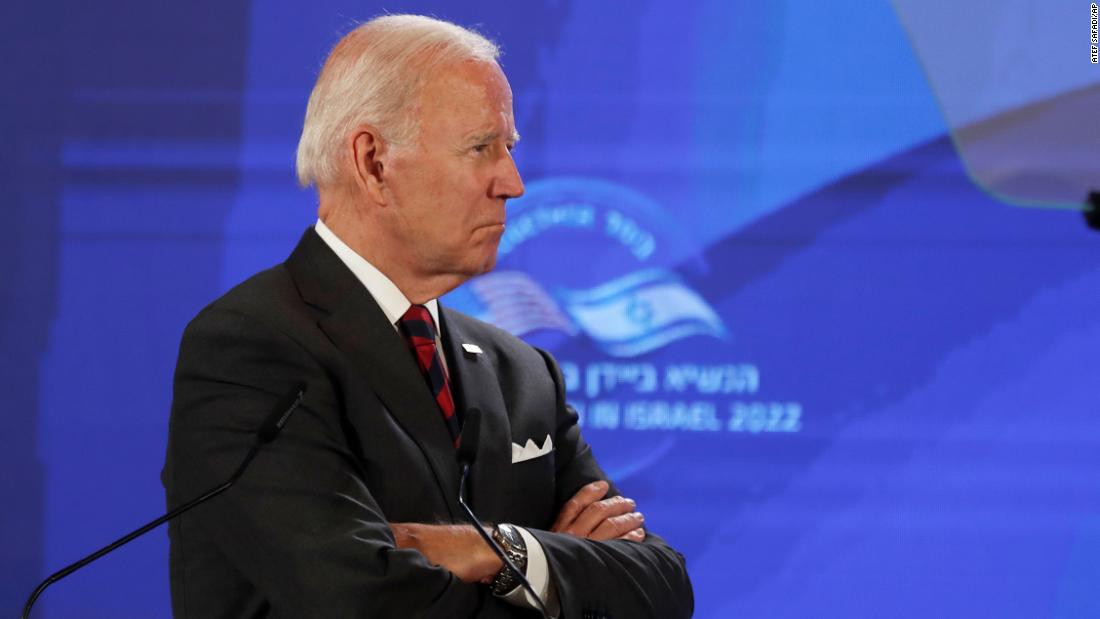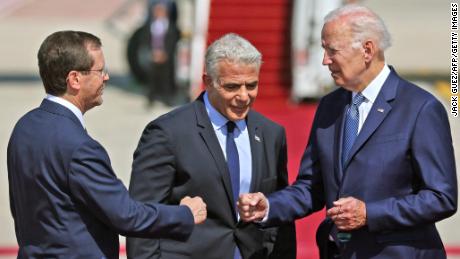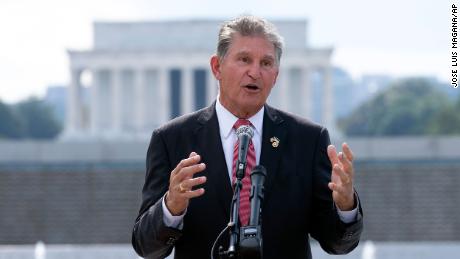
Biden has, after all, put democracy promotion at the center of his foreign policy agenda while bin Salman has presided over the execution of political prisoners, launched a vicious war in Yemen, which has killed thousands of civilians, and was accused of detaining Lebanon’s prime minister in another regional power play.
“The reason that I’m going to Saudi Arabia … is to promote US interest … in a way that I think we have an opportunity to reassert what I think we’ve made a mistake of walking away from: our influence in the Middle East,” Biden said Thursday.
And Biden has a strong interest in reasserting America’s leadership as its great power rivals Russia and China seek new inroads in the region. So the President’s claim, that it is now in US interests to reengage with Saudi Arabia after the 2018 Khashoggi killing severely strained relations, does have merit — even though he’s taking heat from progressives in his party for doing so.
Balancing act
With his visit, the President, who vowed to make the Saudis a “pariah” on the campaign trail in 2020, is experiencing a rite common to commanders-in-chief who have to sometimes dilute their own political interests for a wider strategic goal.
“How do we balance our interests in the free flow of oil at reasonable prices with our values,” asked former US ambassador to Israel Martin Indyk on “Amanpour” on CNN International this week, encapsulating Biden’s dilemma.
“Somehow, the President has to walk the line. We need the Saudis to increase oil production to bring the price down because that is having a terrible impact on inflation. On the other hand, we need to take a clear stand against the way (Mohammed bin Salman) treats some of his people some of the time.”
The distasteful aspect of this trip is that there is no way for Biden to accomplish his goals without elevating bin Salman, who is the dominant figure in the Saudi royal family and will use the visit of an American President to rehabilitate himself globally and to send a message to other strongman-ruled states that there is no longterm price for acting in a way that offends American values. He may, therefore, not feel especially beholden to offer wide-ranging concessions.
Still, Biden argued in a recent Washington Post op-ed that the broader aspiration of using his trip to promote regional stability was important since it could prevent the conflicts that led to US troops having to fight and die in the Middle East for decades. Biden — whose worldview was shaped by his own experiences and that of his late son Beau, who served in Iraq — has put avoiding new foreign wars at the center of his presidency. This is also one reason why he is committed to trying to revive the Iran nuclear deal, which could head off a fateful decision on whether he might use military force to prevent Tehran from getting a nuclear weapon.
Why does the US have an alliance with the Saudis?
The question of balancing US principles and national interests was bound to resurface for Biden sooner or later in relation to the Saudis because it has been a constant theme of US relations with the kingdom for over half a century. Saudi Arabia, for instance, has long been a key strategic US ally, but its tolerance for radical Wahabi Islam provided a fountain of extremism in which terrorism grew and eventually led to events like the September 11 attacks in 2001.
“The question for me, (is) why did it take an emergency visit from the United States President to convince the Saudis to choose their ally, the United States?” Murphy asked.
“I thought the whole point of the United States’ decision, over multiple administrations, to look the other way when the Saudis chopped up political opponents, when they bombed civilians inside Yemen, when they executed political prisoners, was that when the chips were down, we would not have to make an emergency visit for the Saudis to choose the United States.”
Why is Biden meeting the oppressor and not the oppressed?
And one concern for the administration is that there is no guarantee that more oil on the market will lower gas prices — sent racing higher by the war in Ukraine — permanently. This is because one of the issues in the industry has been a scarcity of refining capacity coming out of the pandemic — a situation a sudden flood of crude could actually exacerbate.
A trip to the region that doesn’t produce clear wins for the President could add to perceptions of a presidency that is losing direction — even if Biden’s foreign policy, especially his revival of the Cold War coalition of Western nations to confront Russia over the invasion of Ukraine, has been largely successful.
The brutal murder of Khashoggi has become a metaphor for wider US concerns about human rights in Saudi Arabia, which include the fate of political prisoners, summary executions, the treatment of women and the disregard for civilian life in Yemen.
The President appeared tetchy at a news conference in Israel on Thursday when he was pressed over whether he would raise the case of the Washington Post journalist when he was with bin Salman.
“I always bring up human rights. I always bring up human rights, but my position on Khashoggi has been so clear. If anyone doesn’t understand it in Saudi Arabia or anywhere else, then they haven’t been around for a while,” Biden said.
Lina al-Hathloul, a Saudi democracy activist, told CNN’s Jake Tapper on Thursday that it would be a “betrayal” if Biden didn’t bring up US concerns about Saudi Arabia’s human rights record. Human rights organizations have called on Biden to meet political dissidents while he is in Saudi Arabia, a step some past presidents took when doing business with totalitarian regimes. So far there has been no announcement from the White House of any such contacts
“Why is he meeting with the oppressor and not meeting with the oppressed?” she asked.

